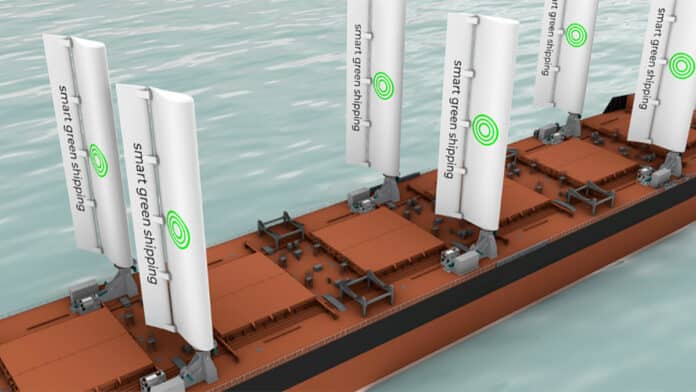Nuclear Transport Solutions (NTS), part of Britain’s Nuclear Decommissioning Authority, has partnered with a renewable marine technology specialist as part of a sustainability project which could see revolutionary new sail technology used on its ships.
NTS has teamed up with Smart Green Shipping (SGS), a renewable systems design and engineering company that is developing unique retrofit sails and sustainable technology for commercial ships. The project is part of a two-year plan called Winds of Change. It will inform future opportunities which could see the sails fitted to ships that could significantly reduce vessel fuel consumption and CO2 emissions.
The project is currently undergoing technical, commercial, and environmental assessments and will run until March 2025.
NTS is involved in transporting spent nuclear fuel over large distances. Currently, the agency has a fleet of three diesel-powered ships and is looking to reduce the carbon emissions from its operations. Typically, using sails can help reduce fuel consumption by 20%.
However, retrofitting sails on an existing ship is challenging as adding elements can severely impact the available space and the flow of operations.
To address these issues, NTS has teamed up with SGS for its expertise. SGS’ FastRig technology is designed to be retrofitted to existing commercial vessels with available deck space – bulkers and tankers.
The FastRig system consists of airfoils that serve as sails, mounted in sets on the deck of a ship, with one part attached to the mast while the other hinging off the first like the flaps on an aircraft wing. Artificial intelligence (AI) is used to set the angle of these sails to maximize the propulsion that can be achieved using the sails. When the sails are not needed, the sails can neatly fold away on the deck to facilitate smooth operations of loading cranes and other gear.
SGS is currently developing a test center in Scotland that will support the safety, technical, and performance data required for any future installation of the sails.
Pacific Grebe, one of three specialist vessels in the PNTL fleet, is being assessed, and a feasibility study has been drawn up to consider the practicalities of fitting the sails. The fleet has an illustrious history of nuclear transportation, safely covering millions of miles to Japan, Europe, Australia, South Korea, and the USA.
“As owners of UK-flagged, high-quality specialist vessels, we’re committed to supporting UK shipping net zero initiatives. We’re excited to be working with SGS to address the highly complex technical challenges that arise from retrofitting wind-assist technology onto merchant’s vessels,” said Andy Milling, Marine Manager at NTS.
“Our motivation is to reduce vessel emissions whilst maintaining our high performance and critical delivery schedules. SGS has convened a group of highly experienced technical and commercial organizations to deliver the project, and it’s exciting to see how we will implement this technology with safety, security, and reliability remaining our top priorities.”
